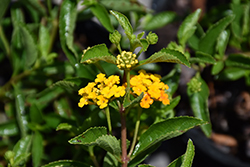It's all about ...
plants

Pineland Lantana
Lantana depressa var. depressa
Height: 24 inches
Spacing: 4 feet
Sunlight:
![]()
![]()
Hardiness Zone: (annual)
Other Names: Rockland Lantana, Shrubverbena, Gold Lantana
Description:
A wonderful heat and drought tolerant native featuring a shrub-like, bushy compact habit, ideal for patio containers and landscape applications; lovely clusters of gold to orange flowers above rich green foliage; low maintenance
Ornamental Features
Pineland Lantana features showy cymes of gold flowers at the ends of the stems from early winter to late fall, which emerge from distinctive yellow flower buds. Its glossy pointy leaves remain dark green in colour with curious grayish green undersides throughout the year.
Landscape Attributes
Pineland Lantana is an herbaceous annual with a mounded form. Its medium texture blends into the garden, but can always be balanced by a couple of finer or coarser plants for an effective composition.
This is a relatively low maintenance plant, and is best cleaned up in early spring before it resumes active growth for the season. It is a good choice for attracting butterflies and hummingbirds to your yard, but is not particularly attractive to deer who tend to leave it alone in favor of tastier treats. It has no significant negative characteristics.
Pineland Lantana is recommended for the following landscape applications;
- Mass Planting
- Rock/Alpine Gardens
- General Garden Use
- Groundcover
- Naturalizing And Woodland Gardens
- Container Planting
Planting & Growing
Pineland Lantana will grow to be about 24 inches tall at maturity, with a spread of 5 feet. When grown in masses or used as a bedding plant, individual plants should be spaced approximately 4 feet apart. Although it's not a true annual, this plant can be expected to behave as an annual in our climate if left outdoors over the winter, usually needing replacement the following year. As such, gardeners should take into consideration that it will perform differently than it would in its native habitat.
This plant does best in full sun to partial shade. It is very adaptable to both dry and moist growing conditions, but will not tolerate any standing water. It is considered to be drought-tolerant, and thus makes an ideal choice for a low-water garden or xeriscape application. This plant should not require much in the way of fertilizing once established, although it may appreciate a shot of general-purpose fertilizer from time to time early in the growing season. It is not particular as to soil type or pH, and is able to handle environmental salt. It is highly tolerant of urban pollution and will even thrive in inner city environments. This species is native to parts of North America, and parts of it are known to be toxic to humans and animals, so care should be exercised in planting it around children and pets. It can be propagated by cuttings.
Pineland Lantana is a fine choice for the garden, but it is also a good selection for planting in outdoor pots and containers. It can be used either as 'filler' or as a 'thriller' in the 'spiller-thriller-filler' container combination, depending on the height and form of the other plants used in the container planting. It is even sizeable enough that it can be grown alone in a suitable container. Note that when growing plants in outdoor containers and baskets, they may require more frequent waterings than they would in the yard or garden.
